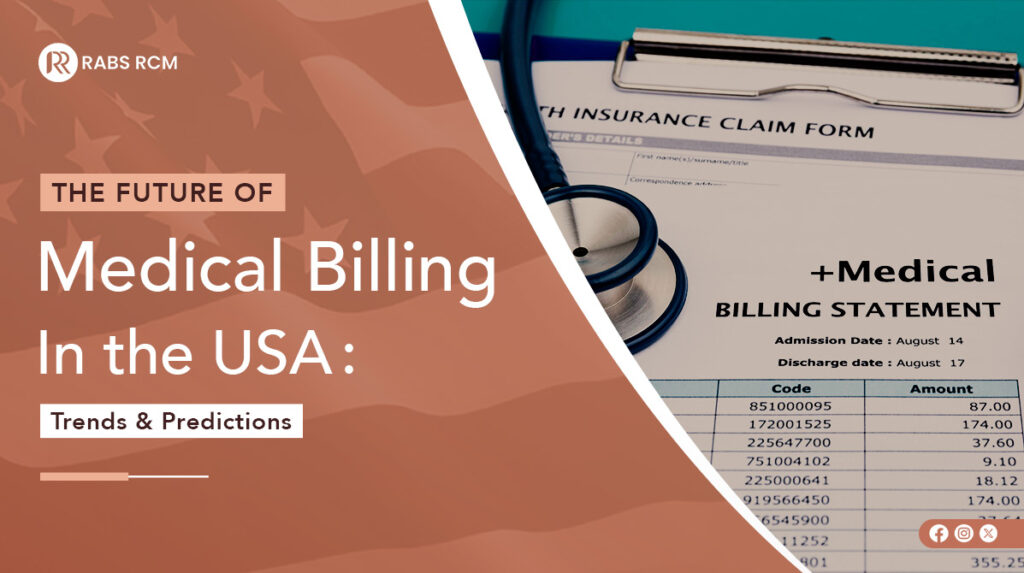
The Future of Medical Billing in the USA: Trends and Predictions
Introduction
As the healthcare landscape continues to evolve, so does the field of medical billing in the USA. The intersection of technological advancements, regulatory changes, and shifting healthcare models is reshaping the way healthcare providers handle billing processes. In this blog, we will explore the future of medical billing in the USA by examining emerging trends and making predictions about the direction this critical aspect of healthcare administration will likely take.
Increased Embrace of Automation
One of the key trends shaping the future of medical billing is the increased adoption of automation. Billing software, artificial intelligence, and machine learning are becoming integral to the billing process, streamlining workflows, reducing errors, and improving efficiency. Automation is expected to significantly affect claim processing, payment posting, and other repetitive tasks.
Shift Towards Value-Based Care
The transition from fee-for-service to value-based care models is influencing medical billing practices. Value-based care emphasizes patient outcomes and quality of care rather than the service volume. It must adapt to new reimbursement models that incentivize positive patient outcomes, preventive care, and overall healthcare quality.
Enhanced Patient Engagement
The future involves a greater focus on patient engagement. With the rise of high-deductible health plans, patients are becoming more financially responsible for their healthcare costs. Billing systems are expected to become more transparent, providing patients with more precise information about their financial responsibilities and facilitating easier communication between patients and billing departments.
Integration of Telehealth Billing
The COVID-19 pandemic has accelerated the adoption of telehealth services, and this trend is likely to continue. As telehealth becomes a more permanent fixture in healthcare delivery, medical billing must integrate seamlessly with virtual care services. Ensuring accurate billing and reimbursement for telehealth visits will be a priority for healthcare providers.
Stricter Compliance Measures
The regulatory landscape in healthcare is ever-changing, and medical billing practices will need to adapt to new compliance measures. Increased scrutiny of billing practices, privacy regulations, and fraud prevention will necessitate a more proactive approach to compliance. Healthcare providers will need to invest in training and technology to stay compliant with evolving regulations.
Rise of Consumer-Friendly Billing Solutions
To meet the demands of a more consumer-driven healthcare environment, the future of medical billing will see a rise in consumer-friendly solutions. This includes user-friendly billing interfaces, transparent cost estimates, and flexible payment options. Improving the overall patient experience with billing processes will become a priority for healthcare providers.
Greater Emphasis on Data Security
With the increasing digitization of healthcare records and billing processes, there will be a heightened emphasis on data security. Protecting patient information from cyber threats will be critical to practices. Healthcare providers will invest in robust cybersecurity measures to safeguard sensitive patient data.
Continued Evolution of ICD and CPT Codes
As medical practices and technologies advance, the International Classification of Diseases (ICD) and Current Procedural Terminology (CPT) code sets will continue to evolve. Professionals will need to stay updated on code changes and guidelines to ensure accurate coding and billing for new and innovative medical procedures.
Collaboration with Payers for Streamlined Processes
Collaboration between healthcare providers and payers will become increasingly crucial for streamlining billing processes. The exchange of accurate and timely information between providers and payers can reduce claim denials, enhance transparency, and expedite reimbursement.
Investment in Staff Training and Development
To navigate the evolving landscape, healthcare providers will invest in ongoing training and development for their billing staff. Keeping teams informed about the latest industry trends, regulations, and technologies will be essential for maintaining efficiency and compliance.
Conclusion
The future of medical billing in the USA is marked by a transformative shift towards automation, patient-centric approaches, and adaptability to new healthcare models. Healthcare providers must proactively embrace these trends, invest in technology, and stay informed to navigate the evolving landscape successfully. By doing so, they can ensure accurate reimbursement, and compliance with regulations, and ultimately contribute to a more efficient and patient-friendly healthcare system.

